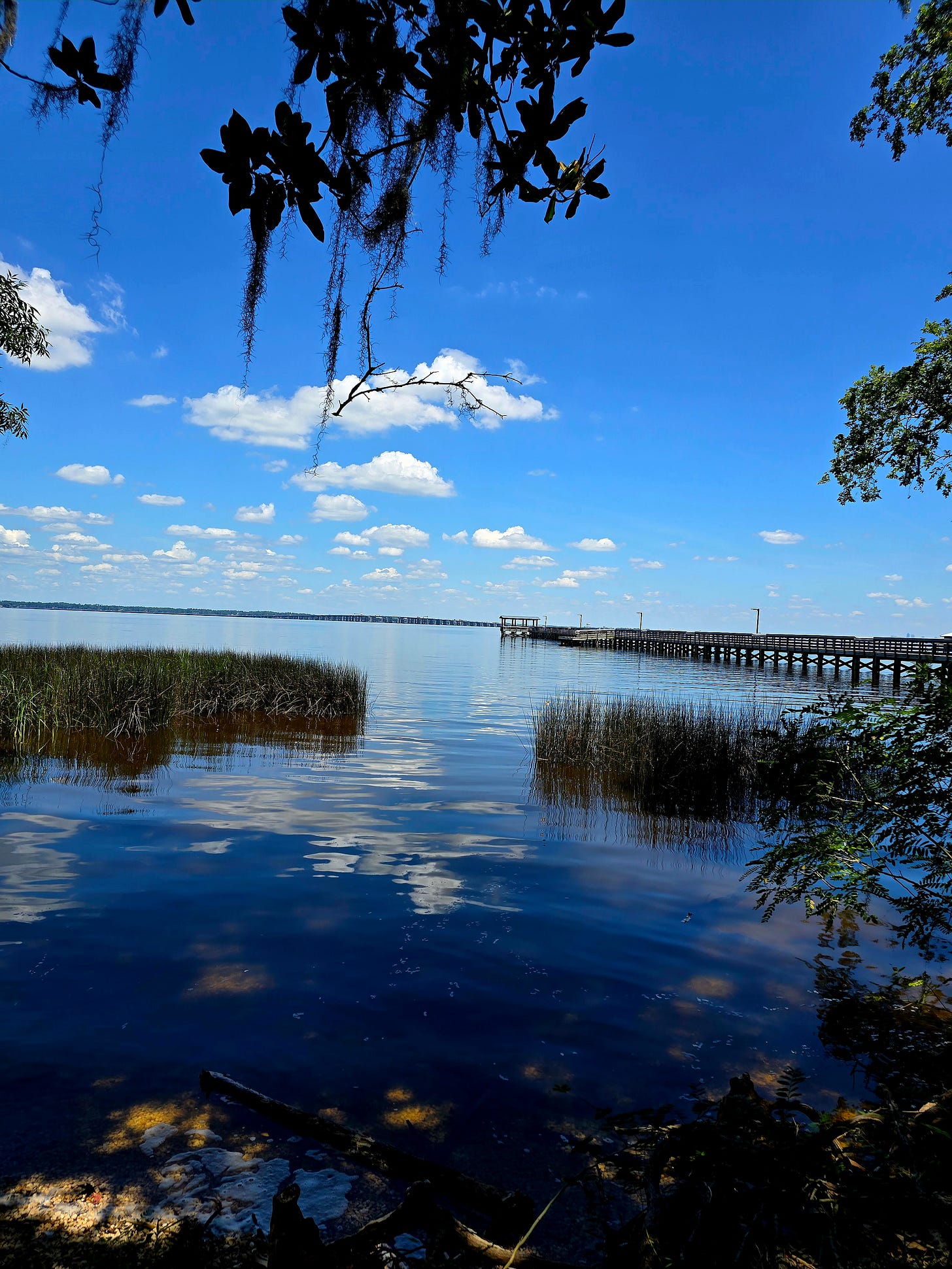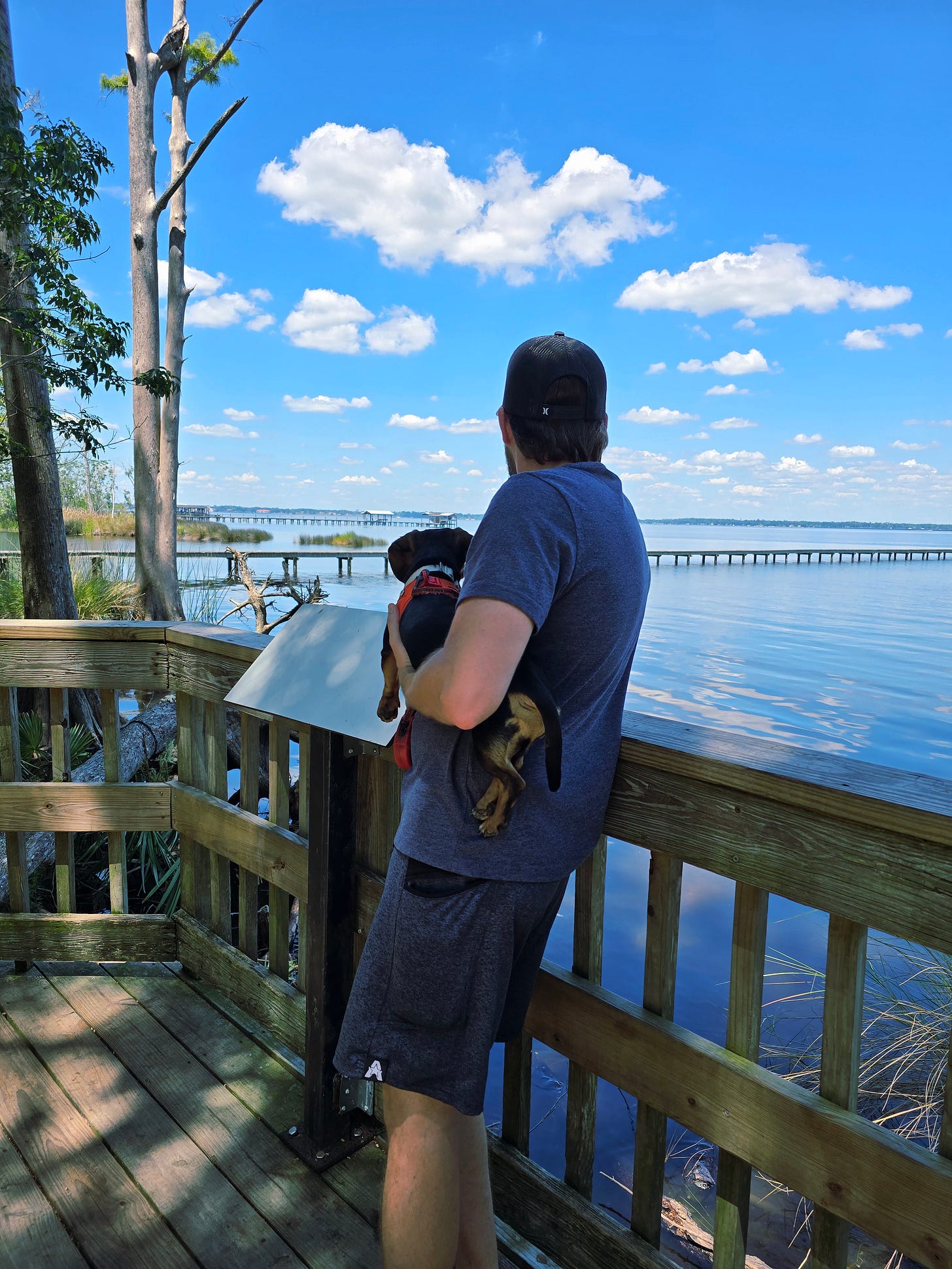“Build, therefore, your own world”
Cultivating inner sanctuary to free ourselves from life’s noise
One of my favorite natural spaces to visit here in sunny Florida is Walter Jones Historical Park. Underneath lofty oak trees and enveloping Spanish moss, visitors can stroll through a winding boardwalk dotted with historic buildings from the area’s earliest days. When you reach the end of the lengthy boardwalk, you surpass the shoreline and stand amidst the mighty St. Johns River, enraptured by a fading perspective, a 360 view of nature. Views of rippling water encompass three directions with a treeline full of cypress and oak behind you. Butterflies even dance around you. If you didn’t have the sweltering sun beating down on you several months out of the year, you’d think you’re in a Disney film.
Recently, on a drive to the park with my husband and wiggly mini-dachsund, we came down with a case of whiplash. It wasn't from another car, but from the view of a construction site just down the road from the park. We slowed down on the two-lane road as we realized where several acres of the same type of natural world inhabiting Walter Jones once thrived—oak trees, sprawling moss, butterflies, and birds—now roved tractors, construction workers, and various equipment already finished with phase one of their project—the clear-cutting of natural space, a natural space that not only once housed a delicate ecosystem existing far before any of us thought about heading to the Sunshine state, but a historic wooden home that once sheltered generations.
A temple for The Church of Jesus Christ of Latter-day Saints will be erected in its place.
It is interesting to me how humans destroy a potent and direct spiritual source, nature, while trying to draw nearer to it.
Man’s proper nature finds us not building over nature, but building around it and in honor of it.
This is why, aside from the importance of the holidays involved, outdoor sunrise services remain so popular among congregations.
I’m not the only one in my community devastated by the leveling of such important untouched land. Currently, there is a significant pushback from tax-paying citizens who rightfully feel they’re being ignored due to the personal agenda of local representatives out of touch with the community they’re supposed to lead and defend.
In a noisy world with increasingly unpredictable behavior and a mental health crisis, the crux of the matter is not a lack of churches. In Florida alone, there are well over 14,000 churches. The crisis of conscience society is facing at a population level is not due to a lack of available outer sanctuary, but a lack of inner sanctuary.
Minding Unfiltered Forces
“You have power over your mind—not outside events. Realize this, and you will find strength."
One of Stoicism’s leading men, Seneca, understood the importance of a rich inner-world. His popular quote speaks to the important realization that in order to live in an empowered state, one must radiate from within. Enlightenment is internal work that can’t be outsourced. The problem with today is most live their lives the opposite way. Many take in external stimuli all around them everyday without even thinking about filtering it—social media posts, the news, group texts, comments from strangers, bosses and coworkers, celebrities, and political groups.
Just as unfiltered water can lead to all types of sickness and disease, so too can unfiltered external forces. And it comes in many forms, from brain fog and anxiety to depression and self-loathing.
Another Stoic, statesman Marcus Aurelius, once said regarding this time-honored vexation:
“I have often wondered how it is that every man loves himself more than all the rest of men, but yet sets less value on his own opinion of himself than on the opinion of others.”
Even ancient civilizations like Rome weren’t immune from peer pressure.
But as the availability of physical sanctuaries, from acreage of unbridled land to family farms and even parks themselves, declines, how do we cultivate the all-important spiritual sanctuary within so that we don’t simply become purely material beings walking around glued to our phones looking for the next arbitrary argument with a stranger?
One of my favorite thinkers, transcendentalist Ralph Waldo Emerson, has some answers.
A Prescription for Nature
*Sound on for the crescendo of the cicada in the video above
For Emerson, building inner sanctuary meant spending time in nature. While his belief that the divine existed in every tree, plant, animal, and sky (and you) was controversial during the 1830s, today, doctors are on board with his philosophical approach.
Amidst a world suffering from chronic device dependency on a wide scale, healthcare professionals are prescribing an ancient concept that has been repackaged for modern times.
Japanese culture has long understood not only the importance of nature, but also the importance of human experience within the sphere of the natural world. In the 1980s, this concept was formally introduced and called shinrin-yoku (森林浴), which translates to the term, “forest bathing.”
These days in the States and abroad, doctors are prescribing this practice to patients. They find that immersing oneself in nature away from screens and devices scientifically reduces stress, resets circadian rhythms, and even aids in the recalibration of individuals' dopamine levels that get so unbalanced due to blue light exposure and constant phone notifications.
This type of reset is so powerful, Emerson equated it to the nourishment one needs for his body to properly function.
“The lover of nature is he whose inward and outward senses are still truly adjusted to each other; who has retained the spirit of infancy even into the era of manhood. His intercourse with heaven and earth, becomes part of his daily food. In the presence of nature, a wild delight runs through the man, in spite of real sorrows.”
Harnessing Internal Sacredness
“Within you, there is a stillness and a sanctuary to which you can retreat at anytime…” -Herman Hesse
But what happens if we don’t have easy access to natural spaces? I’m so fortunate to live in an area still retaining a sense of nature despite rapidly expanding urban construction. But how can we cultivate sanctuary if we live in an apartment or in the thick of the city?
While we often don’t have control over the landscape of outer sanctuaries, we do have complete control over the landscape of our inner sanctuaries. Those can be cultivated anytime, anywhere. And the art of it lies in the simplicity of the process.
The word sanctuary itself stems from the Latin word sanctuarium, which means “sacred place.” When one is seeking sanctuary, one isn’t simply seeking momentary peace, one is seeking a type of healing spiritual respite, and this can take on many forms.
In a world where the sacred is being sacrificed for the profane, it is important to develop the ability to harness one’s internal sacredness—one’s internal tranquility and resolve that is only moved by outside forces in constructive ways, no matter the onslaught hailed against the person.
For Plato, music provided significant sanctuary, so much so, he cautioned against some of its forms.
“Music and rhythm find their way into the secret places of the soul.”
For the influential philosopher, music’s significance directly links it to the laws of morality.
“Music is a moral law. It gives soul to the universe, wings to the mind, flight to the imagination, and charm and gaiety to life and to everything.”
Writer
, who runs the Substack , makes the important distinction between memorizing a poem and looking it up online. By memorizing its words, the essence of the poem works its way into our souls, coloring them for the better.For the Epicureans, a semi-lost philosophical art relevant to America’s founding, champions of the philosophy would meet in a communal garden to discuss ideas and build camaraderie.
Throughout centuries, many have used libraries as essential sanctuaries. Today, libraries remain one of the few quiet places left among a world that literally can’t stop babbling.
All of these perspectives can be applied to one’s private existence. Fill your space with a record player and collect vinyl of your favorite musicians and bands. Memorize the short poem "Invictus" and recite it when facing adversity. Build an herb garden on your porch. Build a succulent garden inside your home. Build a library in your home-office or living room and decorate a designated reading space with cozy accessories.
All of these activities aid in the cultivation of a rich inner world.
Reminders for What Matters
While these moments can seem trivial in today’s society that thrives on chaos and drama, these aspects of personal sanctuary have been utilized by civilizations since the beginning of time for good reason. Music, poetry, gardens, books, these are all spiritual goods that work their way into the fabric of our being and change us for the better. They calm our nerves and restore our peace, they impart wisdom and remind us of what’s important. They reinforce solitude, autonomy, and freedom in a world that desperately wants you to forget those things matter.
“Most great ideas spring from solitude,” Susan Cain, the author of Quiet: The Power of Introverts in a World That Can’t Stop Talking, reminds us.
“The next time you see a person with a composed face and a soft voice, remember that inside her mind she might be solving an equation, composing a sonnet, designing a hat. She might, that is, be deploying the power of quiet.”
“Shake the World”
The more we work to develop inner sanctuary, the more we foster continued peace, determination, and focus.
I’m no expert on the matter, but I’m growing to be increasingly experienced. The destruction of several acres of precious, historic land is proving to be a good test for me regarding the constitution of my inner sanctuary. Though my stomach still knots up a bit every time I drive by the barren plot of once thriving earth I no longer feel anger, but resolve—a resolve to continue building as others destroy. How else could I balance out such devastation?
Emerson once stated, “Build, therefore, your own world.”
As we construct inner sanctuary, as we build dominion over the environment of our own souls, we realize, no man is an island.
Cain points out Mahatma Gandhi said, when you lead from a place such as this, “In a gentle way, you can shake the world.”





It still pains me that I was once a member of and financially contributed to the cult and corporation called “Mormonism” — which named itself “The Church of Jesus Christ of Latter-day Saints” — knowing that since 2018 there has been a push from the (so-called) “leadership” of The Church of Jesus Christ of Latter-day Saints to distance itself from the labels “Mormon” and “Mormonism”.
“Though my stomach still knots up a bit every time I drive by the barren plot of once thriving earth I no longer feel anger, but resolve—a resolve to continue building as others destroy. How else could I balance out such devastation?” — Rebecca Day (author)
I wish that I could cultivate this resolve. When my anger abates, I feel numb despair. I hope that by creating my own inner sanctuary, I can renew a sense of hope for devastated ecosystems to regenerate.